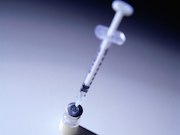Systemic shift in glucose metabolism from oxidative phosphorylation to aerobic glycolysis
THURSDAY, June 21, 2018 (HealthDay News) — The Bacillus Calmette Guérin (BCG) vaccine is associated with a reduction in hyperglycemia among patients with type 1 diabetes with long-term disease, according to a study published online June 21 in npj Vaccines.
Willem M. Kühtreiber, Ph.D., from Harvard Medical School in Boston, and colleagues reported on a randomized eight-year-long prospective examination of type 1 diabetes subjects with long-term disease who received two BCG vaccine doses.
The researchers found that BCG lowered hemoglobin A1c to near-normal levels after year 3 for the next five years. A novel systemic and blood sugar-lowering mechanism drove the BCG impact on blood sugars in diabetes. A systemic shift was observed in glucose metabolism from oxidative phosphorylation to aerobic glycolysis. Metabolomics, mRNAseq, and functional assays of cellular glucose uptake after BCG vaccinations confirmed this finding. Murine data demonstrated a reduction in blood sugars and aerobic induction in non-autoimmune mice that were made chemically diabetic. Six central T-regulatory genes for genetic reprogramming of tolerance were reset with BCG via epigenetics.
“These findings set the stage for further testing of a known safe vaccine therapy for improved blood sugar control through changes in metabolism and durability with epigenetic changes even in advanced type 1 diabetes,” the authors write.
Copyright © 2018 HealthDay. All rights reserved.








